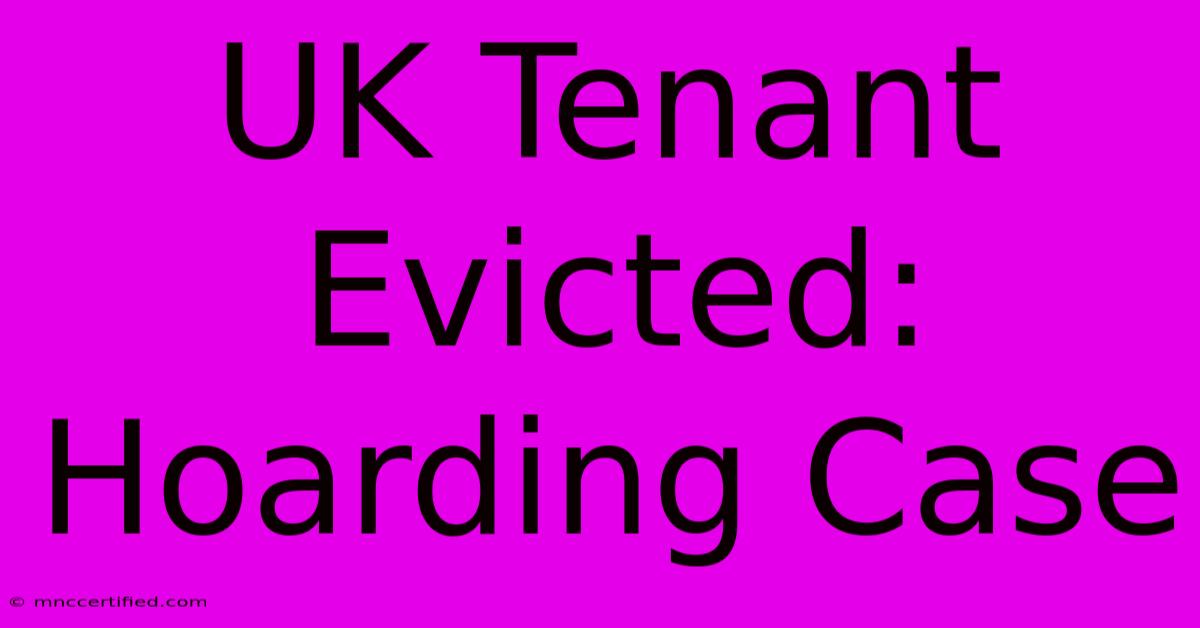UK Tenant Evicted: Hoarding Case

Table of Contents
UK Tenant Evicted: Understanding Hoarding Cases and Eviction Procedures
Being evicted from your rental property is a stressful experience. However, eviction due to hoarding presents unique challenges and legal complexities. This article explores the legal framework surrounding hoarding in UK tenancies, the eviction process, and the support available to tenants facing such situations.
What Constitutes Hoarding in a Rental Property?
Hoarding is generally defined as the excessive accumulation of possessions, regardless of their value, to the point where it impacts the habitability and safety of the property. This isn't simply about a cluttered home; it reaches a level where:
- Health and safety are compromised: The accumulation of items poses risks like fire hazards, pest infestations, blocked escape routes, or unsanitary conditions.
- Property damage occurs: The sheer weight of possessions may damage structures, leading to leaks, mold, or structural instability.
- The property becomes uninhabitable: The excessive clutter makes normal living impossible, impacting access to essential facilities like kitchens and bathrooms.
Landlords have a legal obligation to provide a safe and habitable property. When hoarding breaches this duty, they have grounds for eviction.
Legal Grounds for Eviction in Hoarding Cases
In the UK, landlords cannot evict tenants arbitrarily. Eviction due to hoarding relies on specific legal grounds, often falling under:
- Breach of contract: The tenancy agreement likely contains clauses regarding maintaining the property's condition. Significant hoarding clearly breaches these clauses.
- Section 8 (Grounds 1-17): These grounds under the Housing Act 1988 allow landlords to seek possession of the property due to tenant breaches, including those relating to health and safety. Grounds 8 (serious breach of tenant obligations) and 10 (damage to property) are commonly used in hoarding cases.
- Section 21 Notice (No Fault Eviction): While technically a "no-fault" eviction, a landlord could serve a Section 21 notice if the tenancy agreement allows it and the appropriate notice period has been served. However, given the complexities and potential human rights considerations in hoarding cases, this is rarely the preferred or ethical route.
The Eviction Process for Hoarding
The eviction process for hoarding cases is similar to other eviction procedures but often more complex and protracted:
- Formal Notice: The landlord must serve the tenant with a formal notice, specifying the breach (hoarding) and the required action (removal of items). This often includes photographic evidence.
- Negotiation and Support: Ideally, the landlord should attempt to engage the tenant and offer support to address the hoarding issue. This might involve referring the tenant to relevant charities or mental health services.
- Court Proceedings: If negotiation fails, the landlord must pursue court action. This involves presenting evidence of the hoarding, its impact on the property, and attempts at resolution. A judge will determine whether eviction is justified.
- Eviction Order: If the court grants possession, the landlord can legally evict the tenant. This process usually involves a bailiff.
Important Note: Landlords must follow the correct legal procedures meticulously. Failure to do so can lead to legal challenges and invalidate the eviction.
Support for Tenants Facing Eviction Due to Hoarding
Hoarding often has underlying mental health causes. Tenants facing eviction due to hoarding should seek help:
- Mind: Provides information and support for mental health issues.
- National Hoarding Network: Offers resources and support for individuals struggling with hoarding.
- Local authorities: Can provide advice, support, and potentially funding for decluttering services.
Conclusion: Navigating the Complexities of Hoarding and Eviction
Eviction due to hoarding is a sensitive issue with legal and ethical considerations for both landlords and tenants. Understanding the legal framework, seeking appropriate support, and engaging in constructive dialogue are crucial for resolving such situations fairly and effectively. Both parties should prioritize finding solutions that address the underlying issues and ensure the tenant's wellbeing while protecting the landlord's property. Seeking legal advice is strongly recommended for both landlords and tenants facing these complex circumstances.

Thank you for visiting our website wich cover about UK Tenant Evicted: Hoarding Case. We hope the information provided has been useful to you. Feel free to contact us if you have any questions or need further assistance. See you next time and dont miss to bookmark.
Featured Posts
-
Insurance Coverage Dispute Lawyer
Nov 18, 2024
-
Pak New T20 I Captain After Series Loss
Nov 18, 2024
-
Tulisa From X Factor To I M A Celebrity 2024
Nov 18, 2024
-
Numbers Protocol Price Prediction
Nov 18, 2024
-
Hills Strong Game Saints Defeat Cleveland
Nov 18, 2024